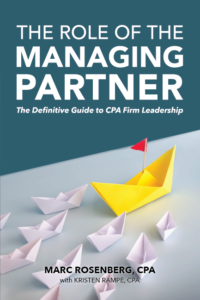Overarching Authorities That MPs Must Have
For MPs to be effective, they must have the authority and flexibility to make decisions without first getting approval and without subjecting those decisions to the nitpicking and negativity that may occur when management decisions are open for debate and discussion.
 There are two caveats to this:
There are two caveats to this:
- Most firms reserve a few major decisions for a full vote of the partners. Examples: mergers and making someone a partner. More on this later.
- The decisions that an MP can make without a partner vote should be (a) formally cited in the firm’s partner agreement and (b) granted by the firm’s executive committee or board.
In other words, for MPs to be effective, a wide swath of authority and decision-making power must be given to them, allowing them to operate freely within these parameters.
A nice, succinct preamble to the authority and duties section of the partner agreement is this:
The MP shall have general and active control of the management and business affairs of the firm on a day-to-day basis. The MP shall exercise general supervision and administration over all the firm’s affairs, with the exception of those decisions stipulated elsewhere in the partner agreement (for example, issues that require a vote of the full partner group).
Specific authorities granted to MPs include:
- Be responsible for the management duties and powers normally exercised by the CEO of a business.
- Have the right to delegate authority to others from time to time and recall the authority so delegated. This includes the appointment of department heads, industry team leaders and administrative positions such as the COO and marketing director.
- Resolve questions and issues relating to ethics and professional standards.
- Determine the types of services the firm provides.
- Hire and fire all employees, other than partners.
- Recommend compensation for employees.
- Create, adopt, enforce, and supervise operating procedures and policies for the firm.
- Pay all expenses and debts as they become due.
- Automatically serve on (or even chair) the firm’s compensation and executive committees.
- Approve all admissions of partners. Note: This is in addition to a vote by the full partner group.
- Manage and administer the firm’s partner retirement system.
- Initiate preliminary no-obligation discussions with any merger candidates.
Organizational success is only possible with strong management and leadership. Growing your Managing Partner’s role, grows the future for your firm.

The Role of the Managing Partner: The Definitive Guide to CPA Firm Leadership
The biggest factor in achieving organizational success is strong management and leadership. In CPA firms, this is the role of the Managing Partner. Want to know how the best MPs across the country are impacting their firms and how you can be a difference-maker and a better MP? Look no further than Marc Rosenberg’s latest…
Learn More